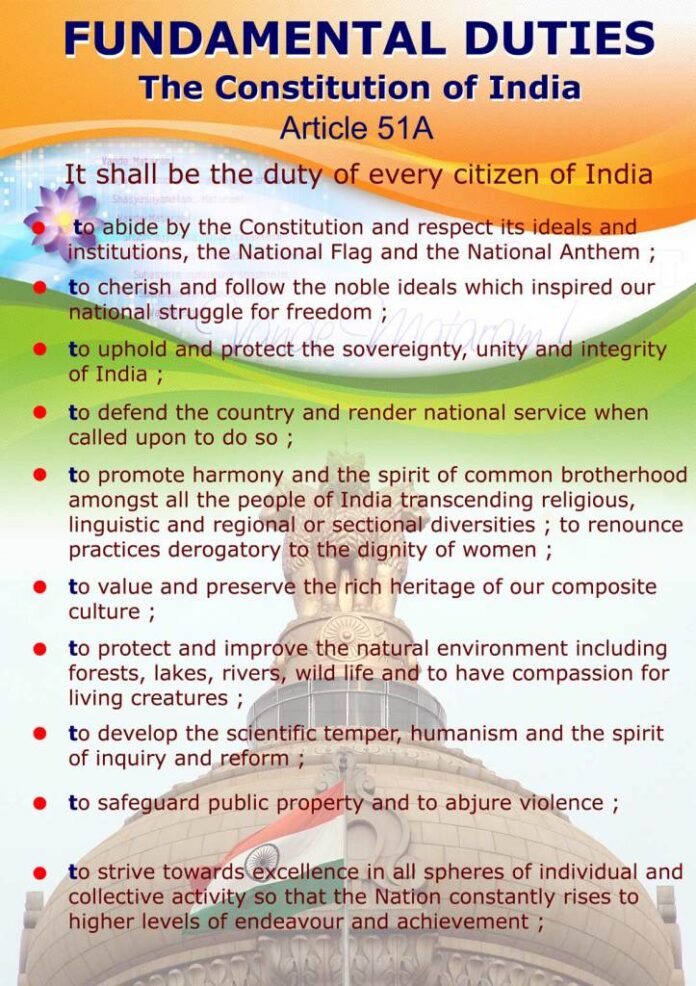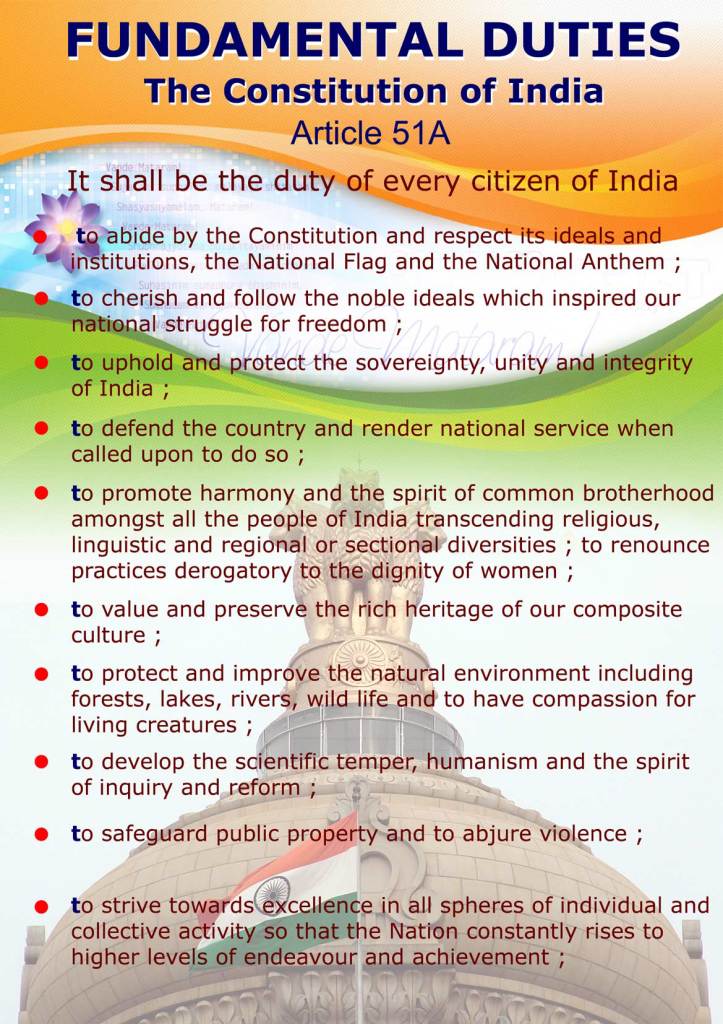
Taking Fundamental Duties Seriously

On Constitution Day our Prime Minister Mr. Narendra Modi stated that performing the fundamental duties should be the first priority of every citizen. Certainly one cannot take issue with his statement. In fact one of the important shifts in the Modi years has been the turn away from Fundamental Rights to Fundamental Duties. Under the UPA there used to be a lot of talk about ‘entitlements’ which were couched in the language of rights – right to food, right to information, etc.? This narrative has been carefully replaced by an insistence on ‘duties’ – actions to be performed by the citizens.
The shift in discourse is accompanied by an attack against the civil society for consistently harping on ‘rights’ and maintaining a studied silence on duties. They have been called ‘andolanjeevis’ and ‘deshdrohis’ and accused of using the fundamental rights such as the right to speech and expression and the right to association to foment public disorder through protests against the government practically forcing the latter to capitulate to their demands.
The civil society should take the criticism (or at least some of it) positively and start to engage with fundamental duties. After all it is the same civil society that talks about Sanvidhan Bachao, and certainly the Sanvidhan which they want to defend consists of both rights and duties. If at all they have neglected the latter, they should respond to Modiji’s call and make some course correction.
The chapter on Fundamental Duties was added rather late to the Constitution in 1976 during the Emergency. Indira Gandhi, during the emergency, had the same concerns as Narendra Modi – that people were protesting too much on the streets and not doing their national duty.
Let us take a look at the Article 51-A of the Constitution which lists 11 fundamental duties and how we can perform these duties as citizens of this great country.
“(a) to abide by the Constitution and respect its ideals and institutions, the National Flag and the National Anthem;
There cannot be any disagreement on this provision especially the duty to respect the National Flag and the National Anthem. The Constitution and its ideals and institutions are sacrosanct. Therefore it is our fundamental duty to be seriously concerned if not indignant if any shadow of doubt falls over any Constitutional Institution and we should speak out if such a thing happens. For instance, it is the fundamental duty of every citizen to follow with utmost care the outcomes in the case in Supreme Court which pertains to the procedure by which Election Commissioners are appointed. The Election Commission is after all a Constitutional Institution under Article 324.
(b) to cherish and follow the noble ideals which inspired our national struggle for freedom;
There cannot be any doubt that the noble ideals which inspired our national struggle included justice, human dignity and freedom. If people are to follow the same ideals today then it would be their fundamental duty to condemn injustice, discrimination and try to ensure equal opportunity for all. It would be their fundamental duty to ensure that the voices of the weaker sections of society are not silenced.
(c) to uphold and protect the sovereignty, unity and integrity of India; and (d) to defend the country and render national service when called upon to do so;
This Fundamental Duty expects people not only to defend the sovereignty, unity and integrity of India but also to educate themselves about the threats to our country. It is a fundamental duty to understand difficult questions like where the 300 kgs of explosives used in the Pulwama terrorist attack came from. More importantly people should satisfy themselves about what Mr.Ajit Doval exactly meant when he said that the civil society is the new frontier of war.
(e) to promote harmony and the spirit of common brotherhood amongst all the people of India transcending religious, linguistic and regional or sectional diversities; to renounce practices derogatory to the dignity of women;
This fundamental duty is of utmost importance. We all have to promote ‘communal harmony’ and ‘fraternity’ which means we have to take a stand against those who call for genocide of minorities, who indulge in hate speech and who issue rape threats. At the same time it is our fundamental duty to continuously assess which practices are derogatory to the dignity of women and denounce them, even if these practices are claimed to be traditional and/or essential to the practice of any religion. Our own religious beliefs and practices should not come in the way of performing this duty. Thus, in the same breath we should equally condemn the killers of Umesh Kolhe and the killers of Inder Meghwal.
(f) to value and preserve the rich heritage of our composite culture;
The practice of this fundamental duty would require citizens to respect the language, dresses and food habits of various communities and not deride any one based on these. This fundamental duty means that nobody should indulge in vigilantism or make insulting remarks towards any Indian language any dress habit. Preserving the heritage of our composite culture would also mean not reducing complex layers of historical interactions between communities into uni-dimensional categories of ‘winners’ and ‘losers’.
(g) to protect and improve the natural environment including forests, lakes, rivers and wild life, and to have compassion for living creatures;
We are fortunate that this fundamental duty has been invoked many times by public spirited individuals and environmental organisations to protect the country’s environment and wild life. This fundamental duty not only requires us all to contribute towards maintaining public cleanliness, reduce our carbon footprints and try to live simpler lives, but also to wonder about what ‘development’ truly means.
(h) to develop the scientific temper, humanism and the spirit of inquiry and reform;
This is an important fundamental duty which underlies all the other fundamental duties. Developing scientific temper and humanism in personal life means a shift away from religiosity, superstition and indulging in any form of discrimination or violence in the name of religion. This fundamental duty would require us to foster a spirit of inquiry, of asking difficult questions in public life. For instance it would be our fundamental duty to inquire whether the construction of temples is a really good way of spending government money especially when we lack good hospitals and schools.
(i) to safeguard public property and to abjure violence;
This is an important fundamental duty and the courts have done much to promote the safeguarding of public property. Citizens too, in the name of protests and andolans, should not harm public property. The fundamental duty to abjure violence also requires judicial interpretation and guidelines in the light of things like self-defence, defending life and property of another, punishments in schools and the limits of state-inflicted violence. Violence should not only be considered bodily harm but denial of livelihood, denial of minimum living space, denial of minimum wages, humane work condition should all be considered violence. It would be every citizen’s duty to express deepest concern that such everyday violence continues to exist in our society and unfortunately even the state inflicts such violence.
(j) to strive towards excellence in all spheres of individual and collective activity so that the nation constantly rises to higher levels of endeavour and achievement;
This fundamental duty is the most difficult to achieve because a vast majority do not have the means to reach their full human potential. Because of their adverse economic, social and geographic situations they are unable to perform their fundamental duty. In such a case it would be the fundamental duty of the state to remove every obstacle in the path of the citizens which prevents them from doing their duty.
(k) who is a parent or guardian to provide opportunities for education to his child or, as the case may be, ward between the age of six and fourteen years.”
The last subsection, (k), on the education of children, was added in 2002 by The Constitution (86th Amendment) Act. The same amendment also introduced Article 21A in the Constitution: “The State shall provide free and compulsory education to all children of the age of six to fourteen years in such manner as the State may, by law, determine.”
This is a fundamental duty which is circumscribed by the socio-economic conditions of the parents and therefore it becomes the fundamental duty of the state to enable the parents to fulfil this duty. There are parents who are too poor to pay hefty fees in private schools and depend on the state schools in order to fulfil this fundamental duty. Therefore the state should not do anything to take away the parent’s ability to fulfil this duty without providing viable alternatives. Any action by the state that takes disables the parent should be taken cognizance of by the courts. For instance, the decision of the Maharashtra government to close down hundreds of government schools across the state is a direct assault on the impoverished parents’ ability to fulfil their fundamental duty. Without waiting for a parent who is already living in dire straits to approach them, the judiciary should take suo motu cognizance and direct the state to help the parents in performing their duty rather than creating unnecessary impediments.
……
Those who call for enforceability of the fundamental duties often present these as being opposed to or contrary to fundamental rights. But the reality is that fundamental duties are possible only when they go together with fundamental rights. After all fundamental rights of the citizens are fundamental duties to be performed by the state. These fundamental rights create the circumstances which enable citizens to perform their fundamental duties. A citizenry without rights is just another name for slaves and slaves cannot perform the fundamental duties of the nature expected by the Constitution. Therefore while welcoming Modi ji’s call to duty we have to also ask what his regime is doing to create a favourable situation wherein citizens may perform their fundamental duties without fear or favour.
Every citizen of India and certainly the civil society could vastly enrich their lives (and their activism) by engaging with the fundamental duties as laid down in the Constitution of India.
- Kalyan Kumar and Paromita Goswami


